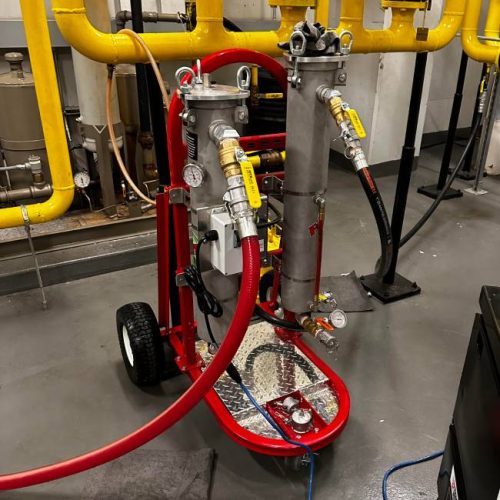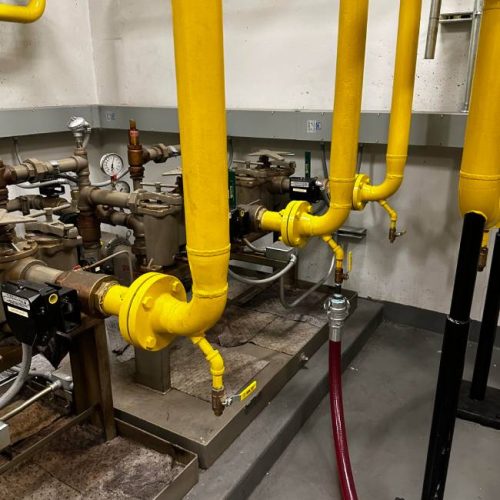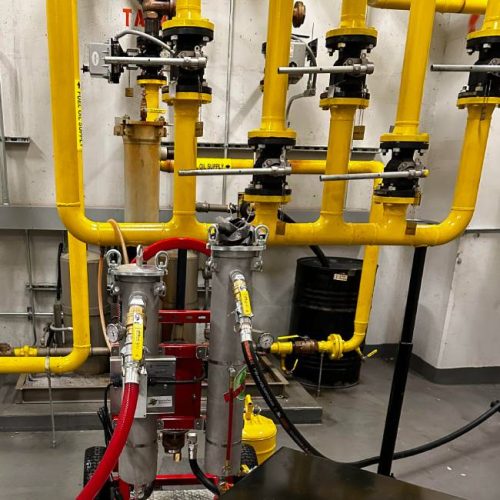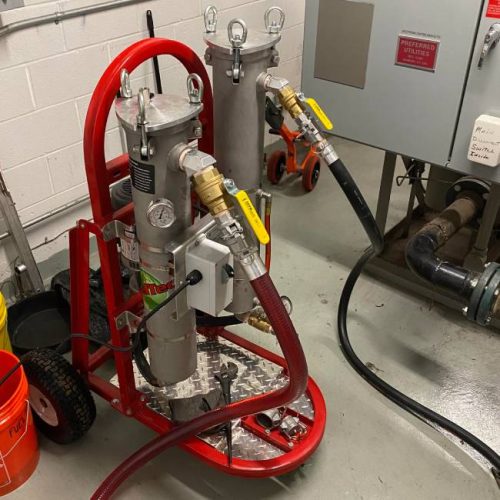Fuel Polishing
Home » Products & Services » Fuel Handling and Storage » Fuel Polishing
Fuel Polishing for Mission-Critical Fuel Systems
Fuel polishing is a process of removing contaminants from stored fuel. It maintains the quality of fuel and prevents problems such as clogged filters, engine damage, and equipment failure. Fuel polishing (sometimes called fuel cleaning) is crucial for critical fuel systems, like those in emergency generators, boilers, and data centers.
Why is Fuel Polishing Necessary?
How Does Fuel Polishing Work?
Benefits of Fuel Polishing
Why is Fuel Polishing Necessary?
Fuel can become contaminated over time from a variety of sources, including:
- Water: Water can condense in fuel tanks, especially in cold weather. Water can also be introduced into fuel during refueling or by leaks in the fuel system. Drastically reducing the amount of water in your system can improve performance.
- Microbial contaminants: Microorganisms, such as bacteria and algae, can grow in fuel tanks. These microorganisms can produce acids that can damage engines and other equipment.
- Solid contaminants: Solid contaminants, such as dirt, rust, and metal shavings, can also be found in fuel. These contaminants can clog filters and damage engines.


How Does Fuel Polishing Work?
Fuel polishing systems use a variety of methods to effectively remove contaminants from your fuel supply. These methods include:
- Filtration system: Fuel is passed through a series of filters to remove solid contaminants that can linger at the bottom of the tank.
- Water separation: Water is separated from fuel using a water separator.
- Chemical treatment: Chemical additives can be used to remove microbial contaminants.

Benefits of Fuel Polishing
Fuel polishing offers a number of benefits, including:
- Improved fuel quality: Fuel polishing can remove contaminants that can damage engines and other equipment. This can help to extend the life of your fuel system and prevent costly repairs.
- Increased fuel efficiency: Fuel polishing can help to remove water and other contaminants that can reduce fuel efficiency. This can save you money on your fuel costs.
- Reduced downtime: Fuel polishing can help to prevent problems such as clogged filters and engine damage. This can help to reduce downtime and keep your mission-critical systems running.

Fuel Contamination Problems Can Wreck Mission-Critical Systems
Fuel polishing is especially important for mission-critical fuel systems. These systems are often used to provide backup power or heat in the event of an emergency. If the fuel in these systems is contaminated, it could lead to a power outage or other disaster.
Here are some of the benefits of fuel polishing for mission-critical fuel systems:
- Increased reliability: Fuel polishing can improve flow rates and help to prevent problems such as clogged filters and engine damage. This can help to keep your mission-critical systems running reliably.
- Reduced risk of downtime: Downtime can be very costly for businesses and organizations that rely on mission-critical fuel systems. Fuel polishing can help to reduce the risk of downtime by preventing problems that can lead to outages.
- Increased Peace of Mind: Feel more secure by knowing that your important fuel systems are well taken care of and safe from dirt.
If you have a mission-critical fuel system, you should consider having it polished regularly. This will help to ensure that your system is always running at peak performance and that you can count on it when you need it most.
Mobile Polishing
Mobile fuel polishing systems are typically mounted on trailers or skids, making them easy to transport to and from different locations. The systems use a variety of filtration methods to remove contaminants from fuel, including:
- Water separation: This method uses a coalescer to separate water droplets from the fuel. The water droplets are then drained from the system.
- Particle filtration: This method uses filters to remove solid contaminants from the fuel. The filters are typically made of paper, metal, or synthetic materials.
- Magnetic filtration: This method uses magnets to remove ferrous metals from the fuel. The metals are attracted to the magnets and are then trapped in a filter.
Mobile fuel polishing systems can polish a variety of fuels, including diesel fuel, gasoline, jet fuel, and biodiesel. They also effectively polish fuel contaminated with water, bacteria, or other harmful substances.
The benefits of mobile fuel polishing include:
- Improved fuel quality: Mobile fuel polishing can remove up to 99% of contaminants from fuel, resulting in cleaner, more efficient fuel.
- Extended fuel system life: Mobile fuel polishing can help to extend the life of fuel system components by preventing them from being damaged by contaminants.
- Increased fuel economy: Mobile fuel polishing can improve fuel economy by up to 5%.
- Reduced maintenance costs: Mobile fuel polishing can help to reduce maintenance costs by preventing the need for costly repairs to fuel system components.
If you are looking for a way to improve the quality of your fuel and extend the life of your fuel system, mobile fuel polishing is a cost-effective option.
Here are some additional details about mobile fuel polishing:
- The process typically takes a few hours to complete.
- The cost of mobile fuel polishing varies depending on the size of the fuel tank and the level of contamination.
- Mobile fuel polishing systems can be rented or purchased.
Conclusion
DIgertt’s fuel polishing service relies on the quality products from Preferred Utilities MFG Corporation. Their Fuel Oil Filtration Sets are an important part of maintaining the quality of fuel and preventing fuel-related problems. It is especially important for mission-critical fuel systems.
Regularly clean your fuel storage tanks to ensure reliable and proper operation of your fuel system during emergencies. Contact us today for a quote.
